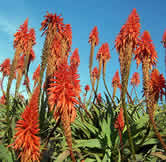Scientific Name: Aloe barbadensis, Aloe Vera
Aloe Vera is a herb that grows in warm climates and is widely distributed in Philippines, India, and Africa. Aloe Vera or Aloe vera has been used as herbal medicine even in ancient times with early records of aloe vera use from Egypt as seen in Ebers Papyrus from 16th century BCE,
Aloe Vera is widely used as traditional herbal medicine in China, Japan, Russia, South Africa, the United States, Jamaica, Latin America and India. Aloe Vera is frequently cited as being used in herbal medicine for its anti-inflammatory, regenerative, anti-bacterial and anti-fungal and properties.
Aloe Vera is a herb that grows up to 35 cm in height with green leaves. Aloe Vera leaves are about 6 cm wide that grows up tapering with spiny margins. Aloe Vera flower grows erect from the herb to as much as twice the height of the plant. Aloe Vera flowers are yellow to red yellow in color that grows to about 2cm.
Aloe Vera is a herb that grows in warm climates and is widely distributed in Philippines, India, and Africa. Aloe Vera or Aloe vera has been used as herbal medicine even in ancient times with early records of aloe vera use from Egypt as seen in Ebers Papyrus from 16th century BCE,
Aloe Vera is widely used as traditional herbal medicine in China, Japan, Russia, South Africa, the United States, Jamaica, Latin America and India. Aloe Vera is frequently cited as being used in herbal medicine for its anti-inflammatory, regenerative, anti-bacterial and anti-fungal and properties.
Aloe Vera is a herb that grows up to 35 cm in height with green leaves. Aloe Vera leaves are about 6 cm wide that grows up tapering with spiny margins. Aloe Vera flower grows erect from the herb to as much as twice the height of the plant. Aloe Vera flowers are yellow to red yellow in color that grows to about 2cm.
Aloe Vera, Traditional Herbal Medicine - Health Benefits
 Aloe Vera is used to treat skin burns, scalds, scrapes, sunburn and wounds. Aloe Vera juice or the fleshy leaves is applied to the skin, believed to improve healing
Aloe Vera is used to treat skin burns, scalds, scrapes, sunburn and wounds. Aloe Vera juice or the fleshy leaves is applied to the skin, believed to improve healingAloe Vera us used for treatment of dandruff, falling hair and baldness. Aloe Vera juice or sap are massage to the scalp
Aloe Vera is used in conjunctivitis, Aloe leaf juice is applied to the outer eyelid
In small doses, Aloe Vera is considered stomachic tonic; in large doses, as purgative.
For hemorrhoids, Aloe Vera cuticle from its leaves is used as suppository for hemorrhoids
In the Arabian peninsula, aloe vera is used for diabetes.
Medical Uses Of Aloe Vera - Health Benefits
 Aloe Vera as anti-leukemic / Anti-Mutagenic : Study isolated di(2-ethylhexyl)phthalate (DEHP) from Aloe vera. It exhibited growth inhibition against three leukemic cell lines and reduced AF-2-induced mutagenicity. DEHP was considered the active principle responsible for the anti-leukemic and anti-mutagenic effects in vitro.
Aloe Vera as anti-leukemic / Anti-Mutagenic : Study isolated di(2-ethylhexyl)phthalate (DEHP) from Aloe vera. It exhibited growth inhibition against three leukemic cell lines and reduced AF-2-induced mutagenicity. DEHP was considered the active principle responsible for the anti-leukemic and anti-mutagenic effects in vitro.Aloe vera has Acemannan / Macrophage Activation : Study isolated a major carbohydrate fraction from the gell of Aloe vera leaf. It has been claimed to accelerate wound healing, immune stimulation and have anti-cancer and anti-viral effects. Study showed acemannan stimulate cytokine production, nitric oxide release. The production of cytokines IL-6 and TNF-alpha were acemannan dose-dependent. The results suggest acemannan may function, in part, through macrophage activation.
 Aloe Vera for Biochemotherapy:Study showed percentage of both objective tumor regressions and disease control was significantly higher in patients concomitantly treated with Aloe than with chemotherapy alone. Study suggest Aloe may be beneficial to use with chemotherapy to increase efficacy in terms of both tumore regression and survival time.
Aloe Vera for Biochemotherapy:Study showed percentage of both objective tumor regressions and disease control was significantly higher in patients concomitantly treated with Aloe than with chemotherapy alone. Study suggest Aloe may be beneficial to use with chemotherapy to increase efficacy in terms of both tumore regression and survival time.Aloe Vera as Antigenotoxic : Study showed antigenotoxic potentials of aloe and suggests a potential use in prevention of DNA damage caused by chemical agents.
Aloe-emodin / Anticancer / Antiproliferative : Study sh owed aloe-emodin inhibited cell proliferation and induced apoptosis in two human liver cancer cell lines, but with different antiproliferative mechanisms. Results suggest aloe-emodin may be useful in liver cancer prevention.
Aloeride / Immunostimulatory Activity : Study characterized a new immunostimulatory polysaccharide, Aloeride, from commercial aloe vera juice
Aloe Vera Herbal Medicine Use And Preparation
Aloe vera leaves contain a clear gel that is often used as a topical ointment.
The green part of the Aloe leaf that surrounds the gel can be used to produce a juice or a dried substance (called latex) that is taken by mouth.
The green part of the Aloe leaf that surrounds the gel can be used to produce a juice or a dried substance (called latex) that is taken by mouth.
Aloe Vera Herbal Medicine Precautions, Side Effects
- Use of topical aloe vera is not associated with significant side effects.
- A 2-year National Toxicology Program (NTP) study on oral consumption of non-decolorized whole leaf extract of aloe vera found clear evidence of carcinogenic activity in male and female rats, based on tumors of the large intestine. According to the NTP, from what is known right now there is nothing that would lead them to believe that these findings are not relevant to humans. However, more information, including how individuals use different types of aloe vera products, is needed to determine the potential risks to humans.
- Abdominal cramps and diarrhea have been reported with oral use of aloe vera.
- Diarrhea, caused by the laxative effect of oral aloe vera, can decrease the absorption of many drugs.
- People with diabetes who use glucose-lowering medication should be cautious if also taking aloe vera by mouth because preliminary studies suggest aloe may lower blood glucose levels.
- There have been a few case reports of acute hepatitis from aloe vera taken orally. However, the evidence is not definitive.
No comments:
Post a Comment